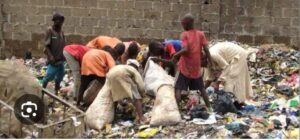

By Dada Ahmed.

Photo credit: Google/Solace.
In the past, child scavenging in Kogi State, north central Nigeria,particularly in Lokoja, was seen primarily as a concern for other states. However, this perception has changed; the issue is now a harsh reality in parts of Kogi, raising serious concerns among residents.
Consequently, residents are increasingly emphasizing the need for the Kogi State government and other stakeholders in child development to address child scavenging—an urgent issue that cannot be overstated.
A troubling reality has emerged, with child scavengers roaming the streets and dumpsites in search of materials to survive.
A recent conversation between this author and children aged 10 to 14 involved in scavenging in Lokoja was particularly eye-opening.
This scenario began when the author, a journalist, entered the Nigeria Union of Journalists (NUJ) Press Centre on Lugard Road, Lokoja, to engage with colleagues about educating, informing, and entertaining the audience.
While exchanging pleasantries, he noticed some children aged 10 to 14. Curious, he struck up a conversation with three of them about why they were in a location where they were least expected, rather than in school.
The outcome of the conversation raised alarm about the future of education for children in Kogi State and, by extension, Nigeria.
Yusuf Kabir, 10, was the first to engage this journalist in the chat.
When asked why he abandoned school for scavenging, he explained that he found no joy in the work but was driven to it by economic hardships and his parents’ indifference toward their children’s education.
Kabir’s response is both heartbreaking and concerning, yet it reflects a child’s unwavering determination to overcome challenges and achieve success.
He shared his experience: “My intention is to go to school and become a medical doctor in the future. However, all my pleas to my parents to enroll me in primary school have fallen on deaf ears as they constantly complain about the harsh economic realities.
“Tired of their complaints, I decided to scavenge to raise money for my enrollment.
“I need about N10,000 to enroll. In this exhausting job, I roam the dump sites in Lokoja, often with an empty stomach, picking up scrap metal and selling it to a company that pays me between N500 and N600 per day.
“So far, I have made N2,500, and I hope to earn the rest because I believe this effort will help me get into school and achieve my life ambition.”
Concerned members of the public in Lokoja express their worry that Kabir is not alone in this alarming trend; millions of his peers face similar challenges. This is because many families in Kogi are not exempt from the economic hardships in Nigeria, which forces some children to take on adult responsibilities.
Residents emphasize that the involvement of school-aged children in scavenging is a pressing social problem that requires immediate attention from the state government and stakeholders.
Social welfare experts explain that child scavenging often results from poverty and a lack of opportunities. Experience shows that these children, some as young as five, sift through waste in search of items to sell or use, putting their health and safety at severe risk. Exposure to hazardous materials, potential exploitation, and the loss of educational opportunities create a cycle that is difficult to escape.
Concerns extend beyond immediate survival. Children engaged in scavenging often miss out on essential education, which is critical for breaking the cycle of poverty. The psychological toll of such an existence can lead to long-term emotional and behavioral issues, leaving them ill-equipped to thrive as adults.
Urgent action is needed to address this issue, and the state government must prioritize comprehensive educational strategies. These should include initiatives that provide free education and vocational training for children and their families, empowering them with skills for better job opportunities.
Experts also call for economic support for poor parents through social welfare programs that assist low-income families and reduce reliance on child scavenging for survival.
Awareness campaigns should be launched to highlight the dangers of child scavenging and the importance of education, engaging communities in finding local solutions.
Collaboration with NGOs is essential, particularly with organizations specializing in child welfare and community development, to create sustainable solutions tailored to the needs of the community and address the growing population of child scavengers in the state.
Health and safety experts urge the state government to develop initiatives that include health screenings and provide safe environments for children as they transition away from scavenging.
The consensus among various community members in Lokoja is that the plight of child scavengers in Kogi State is a humanitarian issue requiring urgent attention. By taking proactive steps, the state government can pave the way for a brighter future for these vulnerable children.
Together, we can break the cycle of poverty and ensure that every child has the opportunity to learn, grow, and succeed without resorting to scavenging,a development that highlights the challenging circumstances that lead children to seek resources in this way, often due to poverty or lack of access to basic needs.
Ahmed publishes The Reporters.

